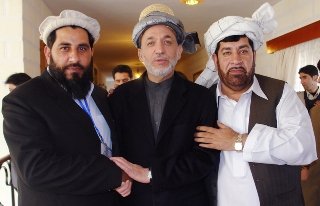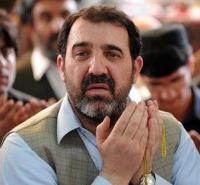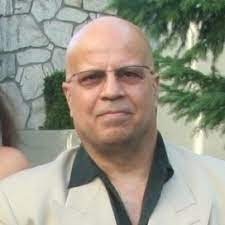By Khalil Nouri, STAFF WRITER

Over history since the 4th century BC, my ancestral city of Kandahar changed hands many times and was fought over by the Arabs, Greeks, Persians, Mongols, British, Russians and now the US and NATO will soon initiate a D-day that could very well decide the fate of the rest of Afghanistan.
This conservative and sacred Pashtun heartland—where Prophet Muhammad’s cloak is placed—has always played a pivotal role with all its political makeup, and now, there is a window of opportunity for control of the city—same as Marjah and Nad-Ali— that is considered an operational nightmare and an opaque situation that could possibly exhaust public opinion and swiftly resulting in a change of strategy in the US-NATO operation.
If this operation is currently considered the cornerstone of the surge effort, and the key to shifting momentum, then only time can correctly measure its success by convincing the Afghan populace that this is a viable political solution. However, in our native view, there are obstacles that could be impasses for the surge to succeed.
The Corleones of Kandahar and the Consequences to Stability
First and foremost, corruption schemes by the Afghan government are nuanced indulgence manipulations of complex tribal politics currently played out by the “Poplazai” and “Barakzai” tribal Chiefs—Ahmad Wali Karzai (half-brother to President Hamed Karzai) and Gul Agha Sherzai (current governor of the eastern province of Nengarhar and former governor of Kandahar). Both families are allegedly linked to narco-mafia criminal gangs and to government corruption. If the U.S. continues to accommodate the existing power structure, it will appear to be regarding corruption as an acceptable status-quo—a bad message for both the Afghan and American public.

One should bear in mind that corruption is the root cause for instability, and power grabbing by these means lies at the center of the intense political competition among the above mentioned leading tribal families and clans. Instead of seeking balance and stability, they outmaneuver their political rivals through extensive alliances to establish themselves as the undisputed leaders of the region. These schemes have far-reaching consequences and result in damaging harmony and national unity in Afghanistan.
This behavior has immeasurably alienated other tribes who are pushed from the course of prosperity; and consequently their corrective measure for balance is the rejuvenation of Taliban recruitment into its organization. The element missing in today’s Afghanistan is a sense of mutual benefit for all tribal elements and a balance of power between the tribes reflected in the central government; without it there is no peace.
Lack of Reliable and Acceptable Afghan Leadership
Afghan President Hamed Karzai sought to rally public support for an upcoming military operation in the Taliban’s birthplace, promising that U.S. and NATO troops will push into insurgent areas only after consultations with tribal leaders.
As he was speaking to about 2,000 officials and tribal leaders in Kandahar last Sunday, in the background was a huge portrait of King Zahir Shah—the popular ex Afghan monarch— that was used to draw constituency for the support of the operation. This clearly shows a lack of Karzai’s “Poplazai” tribal strength compared to the ex-monarch; whose tribal clan has overwhelmingly higher acceptance within the tribal hierarchies and structure in Kandahar—where all the tribal identities are given weight—and elsewhere in Afghanistan.
One must bear in mind, if Kandahar is the key to success in Afghanistan, then a popular tribal acceptance and representation is the key to a balance of power; and consequently to an imminent restoration of peace in the Pashtun Heartland. Therefore, this has been “the” prime flaw for the West since the Bonn conference; by not recognizing this tribal phenomenon, they have wasted time, money and lives.
Although many, including some US Congressional individuals like Dana Rohrabacher and Edward Royce, had enthusiastically advocated for a balanced Afghan tribal leadership consideration prior to the Bonn agreement, an Afghan born US envoy to Afghanistan by the name of Zalmay Khalilzad had the ears of the Bush administration and manipulated the interim Afghan government process that pronounced Karzai as the leader of the post Taliban government.
Hamed Karzai’s most recent intrigue; vote rigging, then charging foreigners and the UN for the presidential election fraud; power grabbing, by dismissing independent election monitors; siding with Ahmadinejat, twice taking trips to Iran at the expense of the US; making the comment, “if the West were seen as an invader and the Afghan government its mercenaries,” he goes on to say, “the Taliban-led insurgency could become a national resistance”; and finally, he is now saying that if he is pushed too hard for reform by the West, he will join the Taliban insurgency.
This is clearly no April fool’s day joke; while politically embarrassing, Karzai’s remarks were neither unprecedented nor, in perspective, surprising. He might only be trying to create more political maneuvering room for himself, or he might be serious. Either way, the relationship between Kabul and Washington is in serious crises.
Hearsay and Personal Knowledge about Karzai
As I recall, from my youth, Karzai’s late father Mr. Abdul Ahad Karzai and my late father were very good friends and colleagues; they both had diplomatic careers with the Afghan foreign ministry. The elder Karzai seemed very charismatic and was well respected by his peers. However, recalling Hamed Karzai from school days, he was actually a couple of grades behind me. A childhood friend’s sister and Karzai’s sister (Fauzia Karzai) were high school friends; and from that friend I learned that, Hamid often isolated himself to read philosophy books and was nicknamed “mad (or) angry Hamid” by his family.
The most recent worldwide- viewed Karzai political brouhaha has revealed that his family “nickname” truthfully portrays his mental instability and exactly as who he is. Karzai’s behavior can only lead to an unpredictable outcome; therefore, the West should not appear weak and kneel down to him. Otherwise, years of Western investment and sacrifices will have been a futile effort.
In Conclusion
Evidently, Karzai maintains a fragile grip on the leadership of his country and is seen by his critics as being too Western, and too much a puppet of Washington. But in the eyes of some Afghans, it is smart politics for Karzai to be seen as his own man by his countrymen. To a great extent, the power of Hamid Karzai depends upon government control in Kandahar. If the province is lost to the Taliban, it will be a major blow to his government, to his personal influence, and to U.S.-NATO operations as well.
It is fairly obvious that the battle for Kandahar will be more political than military—and it will require skills and expertise that are in short supply. In hindsight, seemingly, Karzai and his tribal alliance—the “Popalzai” and the “Barakzai”—are the only ones in Kandahar who can tactically maneuver the West in the direction of failure.
Moreover, Karzai’s recent behavior seems set more on aggravating relations rather than repairing them. Even after almost a decade of fighting, the whole Afghan project is still in a fragile predicament.
Therefore, it should be clearer than ever that the strategy’s success or failure is, in large measure, up to Karzai. If he hasn’t proven to be a reliable partner by now, then it’s time for the U.S. to understand that installing puppets in Afghanistan like the British did for 80 years or the Soviets did for 10 years or we did the same with Karzai for the past 9 years is not the answer.
History shows for a government to succeed in Afghanistan it must not have allegiance to a foreign nation or power. We should learn from the British failures and successes. Allowing the formation of a friendly government to the British; like the ones ruled by Nadir Shah and his son Zahir Shah is the only answer.
And finally, it is unimaginable for us Americans to hear the announcement that “the last U.S. soldier came home from Afghanistan this morning, leaving behind a war that has become a domestic burden and an international embarrassment for Washington”; exactly as was the case when the last Russian soldier left Afghanistan on February 16th 1989.
Khalil Nouri is the cofounder of New World Strategies Coalition Inc., a native think tank for nonmilitary solution studies for Afghanistan. www.nwscinc.org

Khalil Nouri was born in an Afghan political family. His father, uncles, and cousins were all career diplomats in the Afghan government. His father was also amongst the very first in 1944 to open and work in the Afghan Embassy in Washington D.C., and subsequently his diplomatic career was in Moscow, Pakistan, London and Indonesia. Throughout all this time, since 1960’s, Khalil grew to be exposed in Afghan politics and foreign policy. During the past 35 years he has been closely following the dreadful situation in Afghanistan. His years of self- contemplation of complex Afghan political strife and also his recognized tribal roots gave him the upper edge to understand the exact symptoms of the grim situation in Afghanistan. In that regards, he sees himself being part of the solution for a stable and a prosperous Afghanistan, similar to the one he once knew. One of his major duties at the beginning of Operation Enduring Freedom in Afghanistan in 2002 was advisory role to LTG Franklin Hegenbeck. He has worked closely with the Afghan tribes and his tribal exposure is well tailored for unobstructed cross-cultural boundaries within all Afghan ethnicities. He takes pride in his family lineage specifically with the last name “Nouri” surnamed from his great-grandfather “Nour Mohammad Khan” uncle to King Nader-Shah and governor of Kandahar in 1830, who signed the British defeat and exit conformity leaving the last Afghan territory in second Anglo-Afghan war. Khalil is a guest columnist for Seattle Times, McClatchy News Tribune, Laguna Journal, Canada Free Press, Salem News, Opinion Maker and a staff writer for Veterans Today. He is the cofounder of NWSC Inc. (New World Strategies Coalition Inc.) a center for Integrative-Studies and a center for Integrative-Action that consists of 24- nonmilitary solution for Afghanistan. The function of the Integrative-Studies division (a native Afghan think tank) is to create ideas and then evolve them into concepts that can be turned over to the Integrative-Action division for implementation. Khalil has been a Boeing Engineer in Commercial Airplane Group since 1990, he moved to the United States in 1974. He has a Bachelor of Science degree in Mechanical Engineering, and currently enrolled in Masters of Science program in Diplomacy / Foreign Policy.
ATTENTION READERS
We See The World From All Sides and Want YOU To Be Fully InformedIn fact, intentional disinformation is a disgraceful scourge in media today. So to assuage any possible errant incorrect information posted herein, we strongly encourage you to seek corroboration from other non-VT sources before forming an educated opinion.
About VT - Policies & Disclosures - Comment Policy



